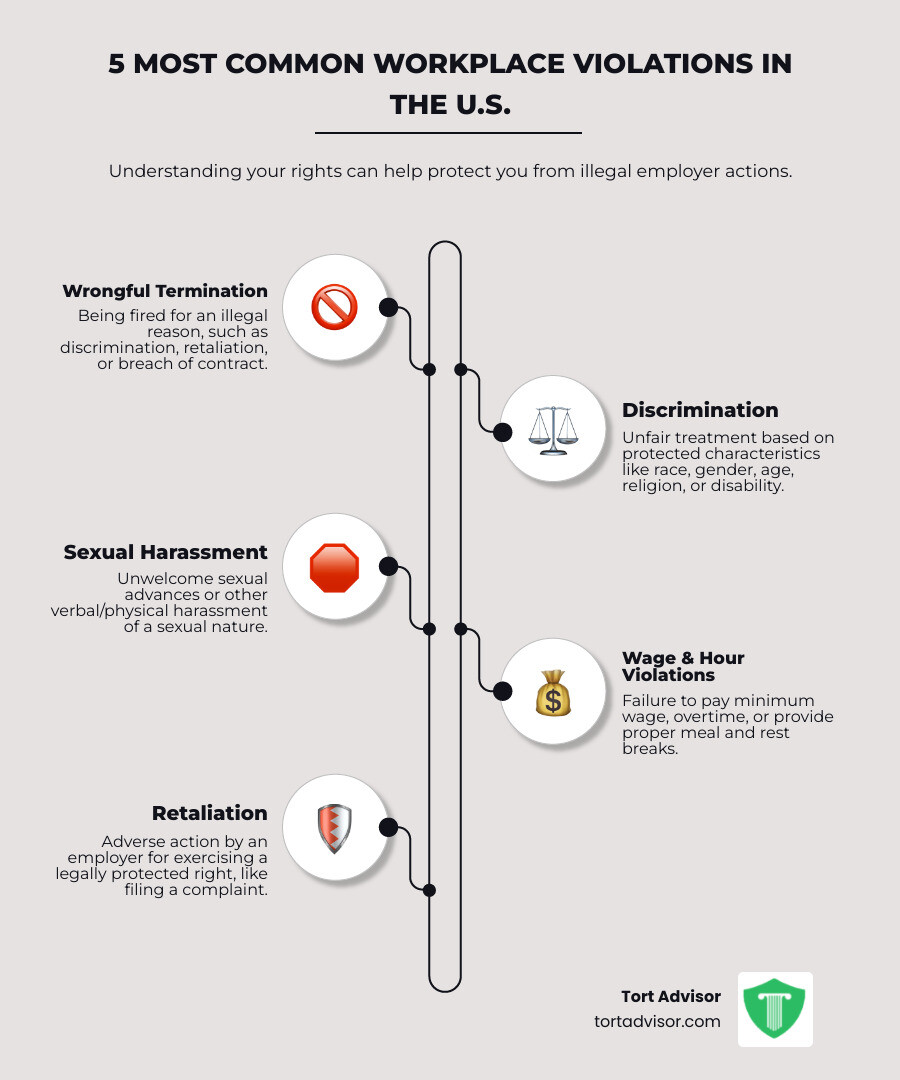


Introduction: Why an Employment Law Attorney is Your Advocate
Navigating workplace disputes can be overwhelming. A skilled employment law attorney is your key ally for resolving complex work issues and protecting your livelihood.
An employment law attorney can:
- Protect your rights at work.
- Clarify complex labor laws so you understand every option.
- Investigate potential violations committed by your employer.
- Negotiate directly with your employer or their legal team.
- Represent you in court or before government agencies.
- Fight for fair compensation when you have been wronged.
Workplace disputes—whether unfair treatment, discrimination, or unpaid wages—cause real stress and uncertainty. This guide breaks down common employment law issues and shows you how to find the right legal partner to level the playing field.
From our background in online legal lead generation, Tort Advisor provides unique insight into connecting people with the best employment law attorney for their specific needs.
What is Employment Law and What Are Your Rights?
Employment law is like a workplace rulebook for everyone, designed to protect employees and ensure fairness throughout their careers. Many states have “at-will” employment, meaning an employer can fire you for almost any reason. However, this doesn’t permit illegal actions. Employers cannot fire you for discriminatory reasons or as retaliation.
State laws, like those in California, often provide stronger protections than federal standards. Navigating these complex rules alone is difficult, which is why understanding your rights and knowing when to call on an employment law attorney is crucial.
For more information on legal matters, you can also explore our resources on personal injury lawsuits.
Understanding the Scope of Employment Law
Employment law defines employee rights and employer responsibilities to ensure a safe, fair, and respectful workplace.
Laws exist at federal, state, and local levels. Federal laws like Title VII of the Civil Rights Act, the Americans with Disabilities Act (ADA), and the Family and Medical Leave Act (FMLA) set nationwide standards. States like California often add broader protections with laws like the Fair Employment and Housing Act (FEHA). Local ordinances can also apply, such as higher minimum wages. Since these laws vary and change, only a qualified employment law attorney can provide advice for your specific situation.
Common Cases an Employment Lawyer Handles
An employment law attorney handles various disputes where an employee’s rights have been violated. Common cases include:
- Wrongful Termination: Being fired for an illegal reason, such as discrimination, retaliation, or in violation of a contract. This is illegal even in “at-will” states.
- Discrimination: Unfair treatment based on protected characteristics like race, color, religion, sex (including pregnancy, sexual orientation, and gender identity), national origin, age (40+), disability, or genetic information. State laws often add more protections.
- Sexual Harassment: Includes quid pro quo (linking job benefits to sexual favors) or a hostile work environment created by unwelcome sexual conduct.
- Hostile Work Environment: Created by severe or pervasive abusive behavior or discrimination that makes it impossible to perform your job.
- Wage & Hour Disputes: Issues with pay, including unpaid minimum wage or overtime, denied meal and rest breaks, misclassification as an independent contractor, or illegal deductions.
- Retaliation: When an employer punishes you for a legally protected activity, such as complaining about discrimination, filing for workers’ comp, or reporting illegal activity (Whistleblower claims).
If you believe your rights have been violated, consult an employment law attorney.
Key Employee Rights You Should Know
Knowing your rights is the first step to protecting yourself. Key protections include:
- Right to Fair Wages: You must be paid at least the minimum wage and receive all earned compensation.
- Overtime Pay: Non-exempt employees are typically entitled to 1.5 times their regular pay for hours worked over 40 in a week.
- Meal and Rest Breaks: Many states legally require employers to provide meal and rest breaks based on shift length.
- Right to Workplace Safety (OSHA): You have a right to a workplace free from serious hazards, as enforced by the Occupational Safety and Health Administration (OSHA).
- Right to Take Protected Leave: Laws like the federal FMLA allow eligible employees to take job-protected, unpaid leave for specific family and medical reasons. You can find more details about your right to take protected leave under the FMLA.
- Right to Reasonable Accommodations: The ADA requires employers to provide reasonable accommodations for employees with disabilities, unless it causes undue hardship.
These are legally binding rights. If you believe they’ve been violated, seek legal guidance immediately.
Why and When Should You Hire an Employment Law Attorney?
Facing an employer in a legal dispute can feel overwhelming, as they often have legal teams. Hiring an employment law attorney levels the playing field. They know the rules, ensure your voice is heard, and steer the legal system to help you get the compensation you deserve.
Who Do Employment Lawyers Represent?
Employment law attorneys typically represent either employees or employers:
- Plaintiff-side attorneys represent employees. They fight for workers’ rights and fair compensation. Organizations like the California Employment Lawyers Association (CELA) often focus exclusively on representing employees, ensuring their loyalty is undivided.
- Defense-side attorneys work for employers, defending companies against employee claims.
For an employee seeking justice, it’s best to choose an employment law attorney who exclusively represents employees. This avoids potential conflicts of interest and ensures their experience is dedicated to helping individuals like you.
Top Reasons to Hire an Employment Law Attorney
While some workplace issues are minor, illegal treatment requires professional help. An employment law attorney is essential in these situations.
Here’s why hiring one is a smart move:
- Expert legal knowledge: They understand complex and ever-changing federal, state, and local employment laws.
- Objective assessment of your case: They provide an unemotional assessment of your case, its strength, and potential damages.
- Skilled negotiation: They can secure a fair settlement and protect you from accepting a low offer or waiving your rights.
- Litigation experience: If a settlement isn’t reached, they have the experience to represent you in court.
- Understanding of filing procedures and deadlines: They ensure all paperwork is filed correctly and on time, meeting strict deadlines like those for filing a charge with the EEOC.
- Resources and support: Law firms provide the time, money, and staff needed to stand up to large employers.
Signs You Need to Contact a Lawyer Immediately
Certain situations require immediate legal attention. Contact an employment law attorney if:
- You were fired shortly after reporting illegal activity, complaining about harassment, or taking protected leave (potential retaliation).
- You were denied legally required leave (e.g., FMLA) or a reasonable accommodation for a disability.
- Your employer fails to address severe or ongoing harassment or discrimination.
- You’re offered a severance agreement. Never sign one without a lawyer’s review.
- You are a victim of wage theft (unpaid wages, overtime, or denied breaks).
- Your employer asks you to do something illegal (potential whistleblower situation).
- You feel something is legally wrong at work. Trust your instincts.
Statutes of limitations for employment claims can be very short (as little as 180 days). If you suspect a violation, document everything and seek legal guidance immediately.
The Legal Process: From Evidence to Compensation
Pursuing an employment law claim is a brave step. The process, while daunting, aims for justice and requires careful attention to detail. An employment law attorney is essential for navigating each step, from gathering evidence to meeting deadlines, to maximize your chances of securing fair compensation.
Gathering Crucial Evidence for Your Claim
Strong documentation is critical for an employment law case. Start saving everything the moment you suspect a violation. Key evidence to gather includes:
- Emails and text messages related to the issue (forward work emails to a personal account).
- Performance reviews, especially if they show a sudden negative shift after you raised a concern.
- Employment contracts or offer letters.
- Employee handbook and company policies.
- Pay stubs and wage statements for wage claims.
- Contact information for potential witnesses.
- A personal journal with a detailed, factual log of incidents (dates, times, people involved, what was said/done).
- Records of reports to HR or supervisors, including their responses.
Your employment law attorney can help you identify and organize the most crucial evidence.
Understanding Statutes of Limitations in California
The “statute of limitations” is a strict deadline for filing a claim. Missing it means you lose your right to sue, regardless of your case’s merit. In California, these deadlines vary by claim type. For many claims, you must first file a complaint with an agency like the Department of Fair Employment and Housing (DFEH) or the Equal Employment Opportunity Commission (EEOC).
| Claim Type (California) | Typical Statute of Limitations |
|---|---|
| Discrimination, Harassment, Retaliation (FEHA) | 3 years (to file with DFEH) |
| Wage & Hour Violations | 2-4 years (varies by claim) |
| Wrongful Termination (Common Law) | 2 years |
| Federal Discrimination (EEOC) | 180 or 300 days |
These are general guidelines, and exceptions can apply. Contact an employment law attorney immediately to ensure you file on time and protect your right to seek justice.
Potential Outcomes and Remedies in a Successful Case
A successful employment law case can result in various remedies to compensate for the harm you suffered. Your employment law attorney will work to achieve the best possible outcome.
Potential remedies include:
- Back pay: Lost wages and benefits.
- Front pay: Future lost earnings if you cannot return to your job.
- Reinstatement: Getting your job back.
- Emotional distress damages: Compensation for pain and suffering.
- Punitive damages: Awarded in cases of extreme misconduct to punish the employer.
- Attorney’s fees and court costs: Your employer may be required to pay these if you win.
- Out-of-pocket expenses: Recovery for costs like job searches or medical bills.
A skilled employment law attorney can make a significant difference in the compensation you receive. For more context on how much legal recoveries can be, you might be interested in How Much Does Mass Tort Lawsuits Receive?.
How to Choose the Best Employment Law Attorney for Your Case
Choosing the right employment law attorney is a critical step. You need a dedicated advocate with a proven track record who understands your situation and communicates clearly. Vet potential attorneys through initial consultations to make an informed decision.
Key Qualities to Look for in an Employment Law Attorney
Look for these key qualities in an employment law attorney:
- Specialization in employment law: Choose an attorney whose practice focuses primarily on this complex area.
- Represents employees exclusively: A lawyer who only represents employees has undivided loyalty and no conflicts of interest.
- Proven track record of success: Look for a history of favorable settlements and verdicts, along with strong client testimonials.
- Excellent communication skills: Your attorney should explain complex legal concepts clearly and keep you informed. In some states, look for special credentials like Board Certification, which indicates a high level of expertise.
Understanding Legal Fees and Costs
Don’t let cost deter you from seeking justice. Many employee-side employment law attorneys offer flexible fee structures to make legal help accessible.
Most employee-side cases are handled on a contingency fee basis. You pay no upfront fees; the lawyer receives a percentage of the amount recovered. If you don’t win, you don’t pay attorney’s fees. This aligns your interests with your attorney’s. Learn more about contingency fees from Cornell Law School.
Other fee structures include hourly rates or retainer fees (an upfront payment). Many attorneys offer a free initial consultation to discuss your case. Always clarify the fee structure upfront and get a written agreement.
Questions to Ask During Your Initial Consultation
The initial consultation is your opportunity to interview the attorney. Ask these key questions:
- What percentage of your practice is devoted to employment law?
- Do you typically represent workers or businesses?
- What is your experience with cases like mine?
- Are you Board Certified in Labor and Employment Law (if applicable in your state)?
- What resources does your firm have to handle my case?
- What is your reputation among your peers?
- Have you ever been reprimanded or disciplined by a bar association?
- Who will I meet with for the consultation, and who will handle my case?
- What are the potential outcomes for a case like mine?
- What is your fee structure, and how do you handle costs?
Frequently Asked Questions about Employment Law
Navigating employment law can be confusing. Here are answers to some common questions to help you understand your rights.
Can my employer fire me for filing a claim?
No. It is illegal for an employer to retaliate against you (fire, demote, etc.) for exercising your legal rights, such as filing a claim or complaining about illegal practices. Strong anti-retaliation laws exist at federal and state levels to protect you.
“Protected activities” include complaining about discrimination, reporting wage violations, requesting FMLA leave or disability accommodations, and participating in investigations. If you are punished after performing a protected activity, you may have a retaliation claim. Document everything and contact an employment law attorney immediately.
Do I have to file a complaint with an agency like the EEOC first?
Often, yes. For many federal discrimination claims (under laws like Title VII or the ADA), you must first file a charge with a government agency like the Equal Employment Opportunity Commission (EEOC) or a state equivalent. This is called “exhausting administrative remedies.”
The process involves filing a charge, after which the agency may investigate or offer mediation. If the issue isn’t resolved, the agency issues a “right-to-sue” letter, which allows you to file a lawsuit. Deadlines are strict. It is crucial to consult with an employment law attorney before filing with an agency to ensure your complaint is strong and all procedures are followed correctly.
What if the harassment happened outside of the workplace?
Yes, you can often still pursue a claim. If harassment is work-related, it can be unlawful even if it occurs outside the physical workplace.
Incidents at company parties, on business trips, or through work-related digital communication can all contribute to a hostile work environment for which your employer may be liable. Don’t assume off-site or after-hours conduct is irrelevant. Document any harassment and discuss it with an employment law attorney to determine if you have an actionable claim.
Conclusion
Navigating employment law is complex, but you don’t have to do it alone. This guide has covered your fundamental rights, from fair wages to a safe work environment, and the red flags of illegal conduct like wrongful termination or discrimination.
Key takeaways are: know your rights, act quickly due to strict deadlines, gather evidence, and choose the right legal partner. An employment law attorney who represents employees and has a proven track record is your most vital asset. While the law is intricate, seeking justice can lead to significant compensation, including back pay, emotional distress damages, and punitive awards.
At Tort Advisor, we understand these challenges. Our mission is to connect you with vetted, highly skilled employment law attorneys dedicated to advocating for individuals. We help level the playing field to ensure you get the best possible outcome.
Don’t let unlawful workplace practices go unchallenged. Protect your rights and take the first step towards securing your future.
Find trusted legal representation for your personal injury lawsuit today.
Free Confidential Case Evaluation
Complete the short form below to get an immediate FREE case review with an expert in your specific claim. Don't wait, your case could be time sensitive to file a claim.
Related Posts
Did a North Dakota product cause harm? Understand product liability, your rights, and how to take action for defects.
Get justice for clergy abuse. Find an expert Priest abuse lawyer to navigate complex laws and hold institutions accountable.
Diagnosed with meningioma after Depo-Provera? Understand potential Depo-Provera lawsuit settlements, risks, & how to claim compensation.
Uncover the truth about uber sexual assault cases. Learn about the alarming scale, Uber's accountability, and legal options for justice.
Facing wildfire losses? Discover the best wildfire lawsuit attorneys in California to fight for your full recovery and justice.
Exposed to Roundup & diagnosed with NHL? Discover how to sue Monsanto, understand eligibility, & seek compensation. Your guide to justice.









